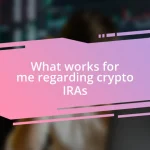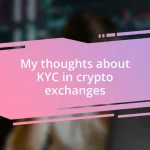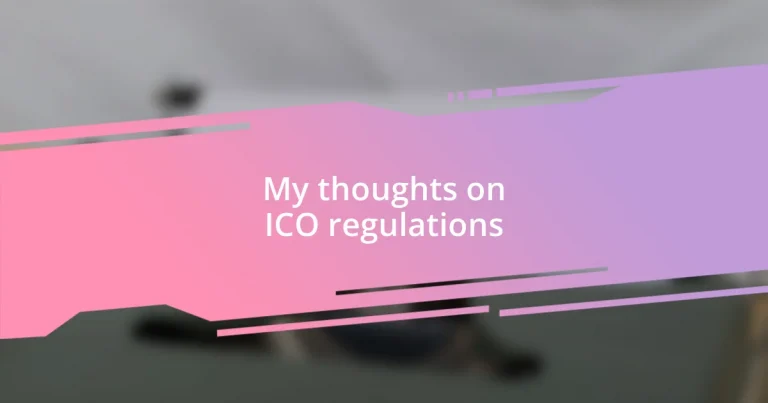Key takeaways:
- Understanding ICO regulations is critical for investor security and trust, with significant differences in regulatory frameworks across jurisdictions.
- Compliance is essential for building a positive market reputation, protecting investors from fraud, and ensuring the long-term viability of ICO projects.
- Future trends may include harmonized global regulations, a focus on sustainability, and the integration of technology for improved compliance in ICOs.

Understanding ICO regulations
Understanding ICO regulations can initially feel overwhelming, especially for newcomers to the cryptocurrency space. When I first encountered Initial Coin Offerings (ICOs), I was struck by the lack of clarity about the legal landscape. It made me wonder, how can investors feel secure when the rules are still being defined?
As I delved deeper, it became apparent that these regulations vary significantly by jurisdiction. For instance, in the U.S., the Securities and Exchange Commission (SEC) has stringent guidelines that aim to protect investors from fraud. I remember feeling a sense of relief when I realized that these regulations exist to provide a safety net, ensuring that not every new token is a gamble.
Navigating the complex terrain of ICO regulations isn’t just about adhering to the law; it’s also about trust. I’ve spoken with many investors who are deeply concerned about scams and mismanagement. It made me realize that a robust regulatory framework not only safeguards investments but also bolsters confidence in the entire cryptocurrency ecosystem. What do you think? Does a clear regulatory environment make you more likely to invest? For me, it certainly does.
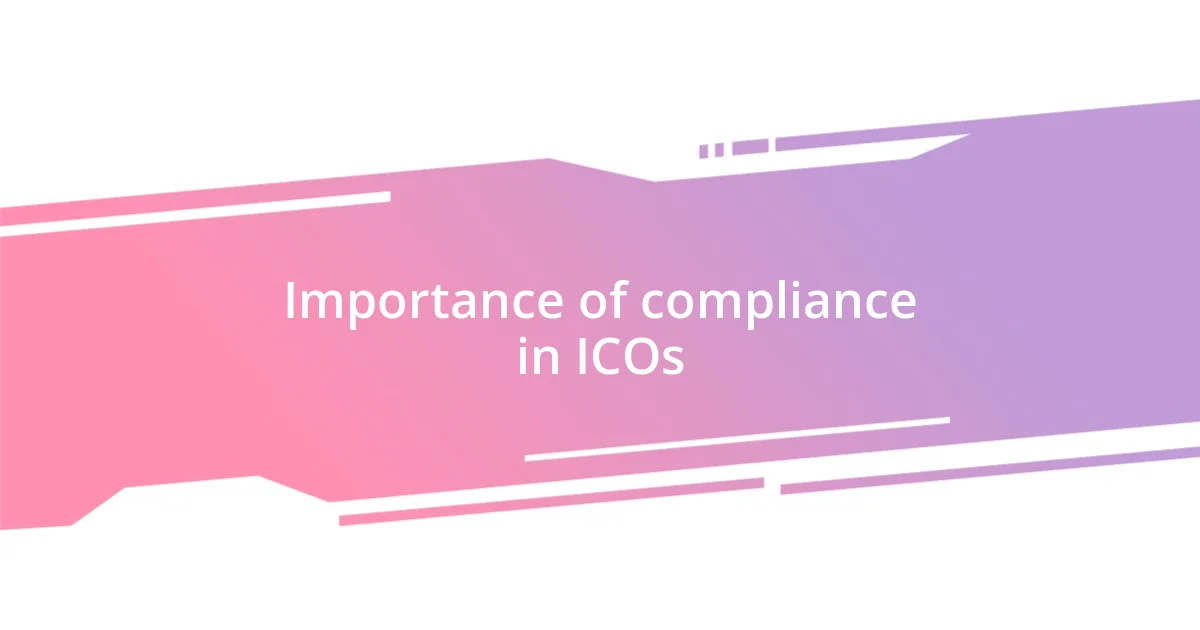
Importance of compliance in ICOs
Compliance in ICOs is critical for building investor trust and ensuring the longevity of projects. I’ve seen firsthand how startups that prioritize regulatory adherence often attract more serious backers. When I attended a conference last year, I noticed that the companies with clear compliance strategies were much more appealing to potential investors; it was as if their commitment to following the rules spoke volumes about their integrity.
Consider these key points on the importance of compliance in ICOs:
- Investor Protection: Adhering to regulations helps shield investors from fraudulent schemes, promoting a safer investment landscape.
- Market Reputation: Companies that embrace compliance are more likely to build a positive reputation, making it easier to attract future investments.
- Legal Security: Compliance mitigates the risk of legal repercussions, allowing companies to focus on their growth and innovation.
- Long-Term Viability: A solid regulatory framework can lead to sustained interest and trust, fostering a healthier ecosystem for all stakeholders involved.
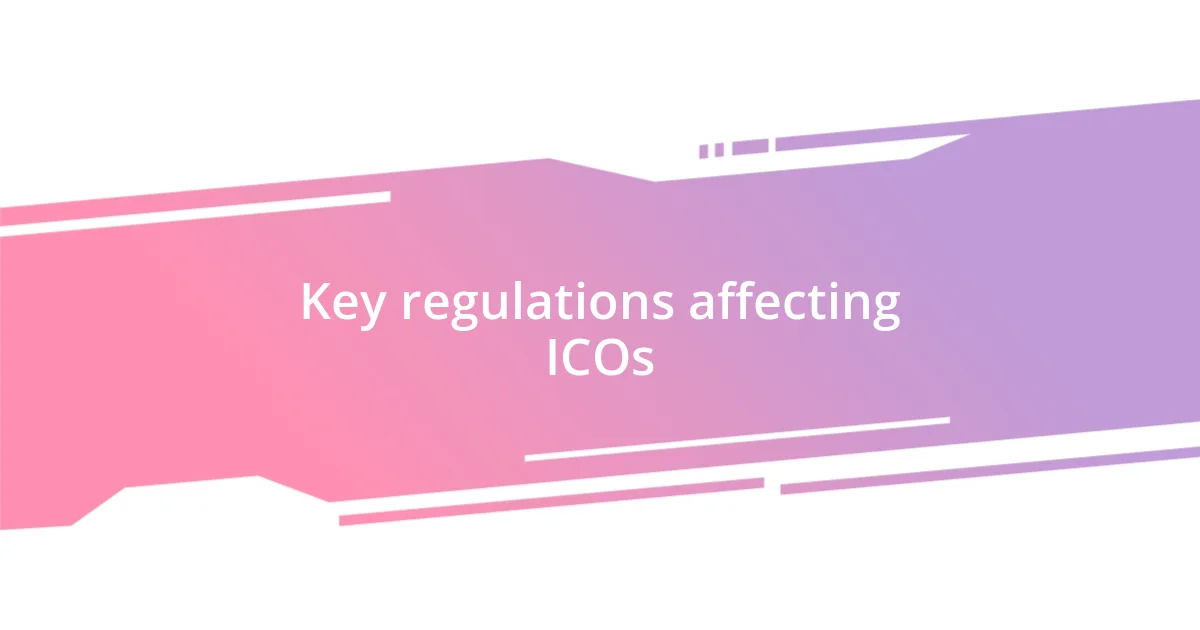
Key regulations affecting ICOs
Regulations have a profound impact on how ICOs operate, shaping everything from their structure to their market engagement strategies. I recall chatting with a founder of a startup who was navigating the SEC’s regulations; it was clear that compliance was not just a checklist but a mindset. The way he spoke about tailoring his project to meet these legal guidelines revealed how integral regulations are for maintaining credibility with investors.
Another key aspect of ICO regulations is the classification of tokens. In many instances, these tokens are considered securities, which brings additional regulatory scrutiny. I remember when the concept of the “utility token” was being heavily discussed. The hope was to sidestep some of the regulatory hurdles, but the complications only multiplied. Having to justify a token’s purpose in relation to securities law certainly keeps founders on their toes.
To address the wide-ranging impact of regulations, I think it’s essential to understand the varying legal frameworks worldwide. Not long ago, I attended a webinar featuring experts from different countries discussing their approaches. It was fascinating to see how regulations could either foster innovation or stifle it entirely, depending on the government’s stance. It really hit home how critical it is for ICO founders to stay informed and adaptable.
| Regulatory Aspect | Description |
|---|---|
| Investor Protection | Regulations help prevent fraud and scams, ensuring a safer investment landscape. |
| Token Classification | Determines if a token is considered a security, affecting compliance requirements. |
| Jurisdictional Variance | Regulations differ globally, impacting how ICOs are launched and operated. |
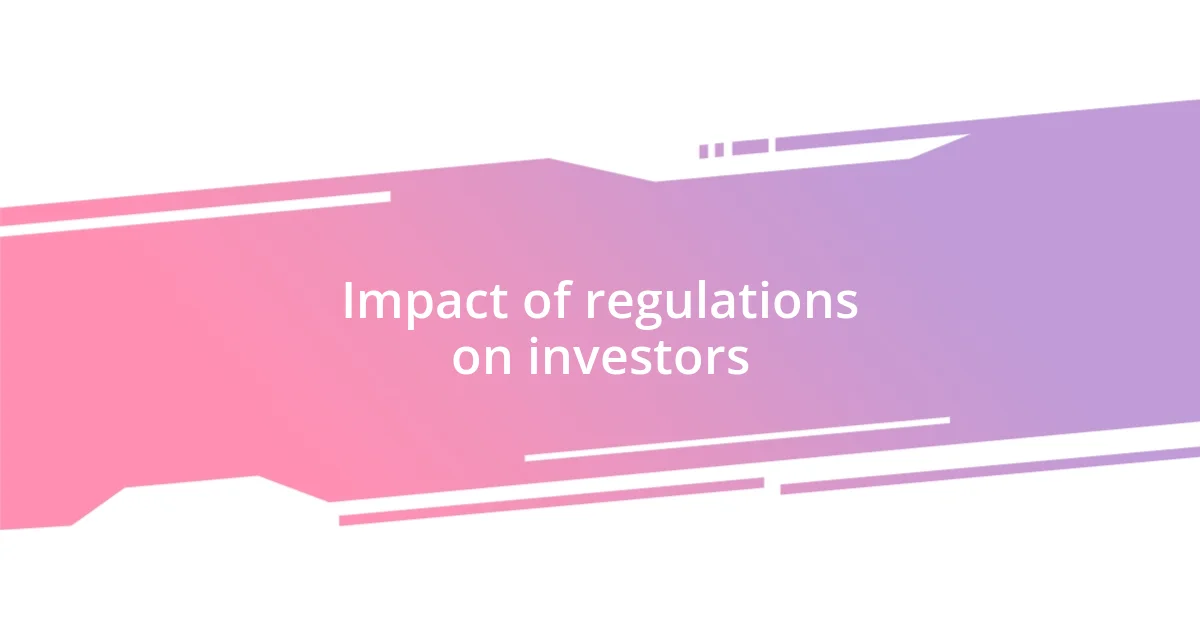
Impact of regulations on investors
Investors feel a sense of security when they know that an ICO is adhering to regulations. I remember talking to a friend who was hesitant about investing in a new token. Her concerns melted away when I explained that the company behind it had a robust compliance framework in place. It made me realize how much of a difference transparency can make; it really influences investor confidence.
On the flip side, I’ve also seen the frustration that arises when regulatory landscapes shift unexpectedly. A colleague launched an ICO just as new regulations were introduced, and he suddenly found himself overwhelmed trying to navigate the changes. It was a stressful period for him. This unpredictability can deter investors who crave stability and clarity, slowing down the entire funding process and potentially jeopardizing promising projects.
Moreover, the emotional aspect cannot be ignored. Regulations can create a sense of safety, but they can also breed anxiety for investors uncertain about the future of their investments. I often ponder: is the promise of innovation worth the potential legal pitfalls? Investing in regulated ICOs means you are more likely to engage with projects that prioritize investor welfare and put in the effort to comply diligently. This balance between risk and security often defines the landscape for many who are considering their next investment opportunity.
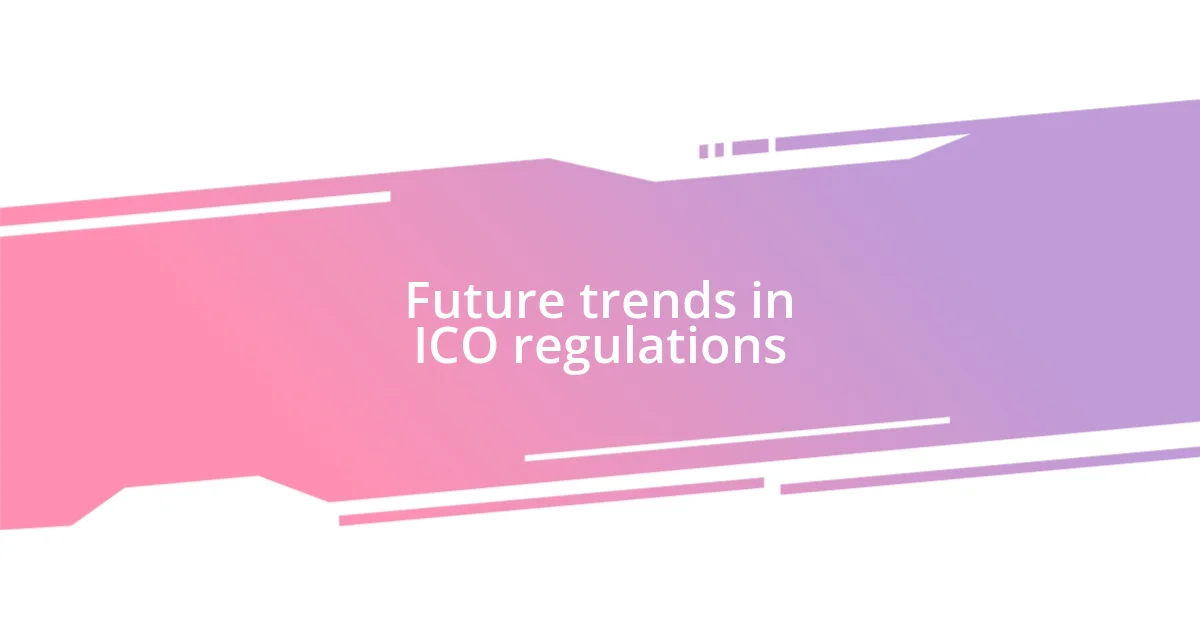
Future trends in ICO regulations
The future of ICO regulations is likely to see increased harmonization across jurisdictions. As I follow the developments, I can’t help but think about a conversation I had with a regulatory expert who described how different countries are beginning to recognize the necessity of a cohesive framework. I wonder, will this lead to a more streamlined process for startups looking to raise funds globally? It certainly could simplify compliance for many founders.
In addition, I anticipate a greater emphasis on sustainability and ethical considerations in ICO regulations. Recently, I attended a panel discussion where industry leaders emphasized that future regulations might include clearer guidelines on the environmental impact of blockchain projects. This makes me curious about how startups will adapt their strategies to showcase not just compliance, but also responsibility. I believe investors will increasingly seek projects that prioritize ethical values along with profitability.
Lastly, the role of technology in compliance will undoubtedly evolve. I dealt with a fintech startup that used sophisticated data analytics tools to ensure compliance with evolving regulations. I found myself genuinely amazed by how technology can transform the regulatory landscape. Will we witness more ICOs leveraging blockchain solutions for self-regulation? It’s entirely possible, and I think it could drive a new era of transparency that benefits everyone involved.
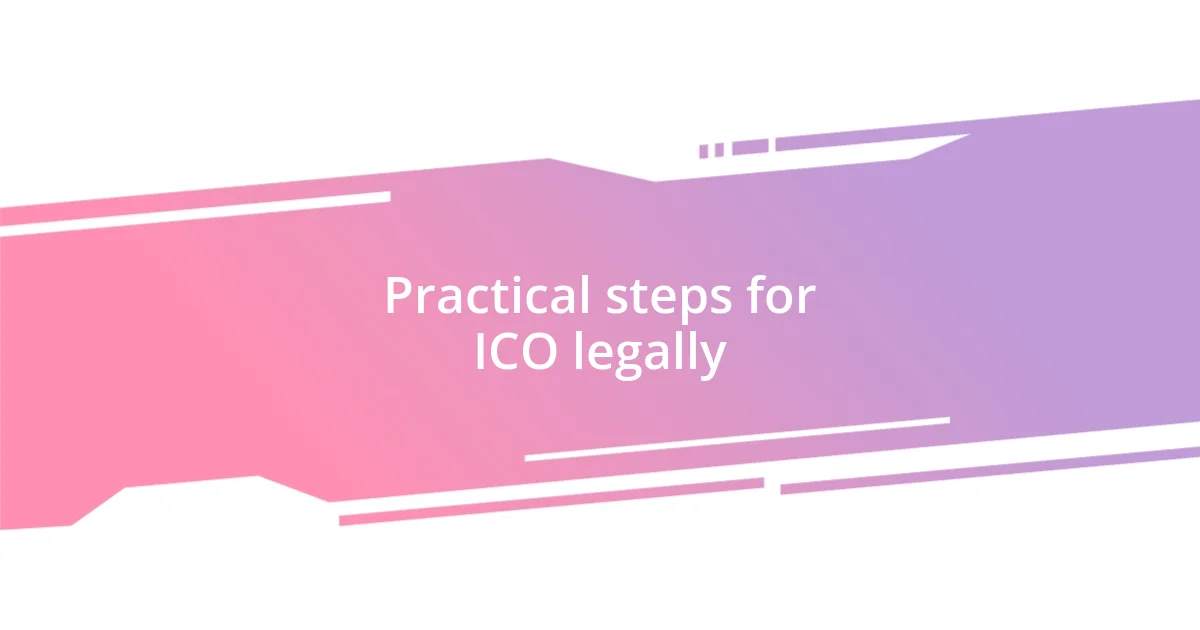
Practical steps for ICO legally
One of the first practical steps for conducting an ICO legally is to determine the regulatory framework that applies to the specific token. I recall when I was advising a startup that had high hopes for their launch. They faced major setbacks because they didn’t realize they needed to consider whether their token would be classified as a securities offering. Prioritizing initial legal consultation saved them from potentially expensive misunderstandings and pitfalls. Have you thought about what regulations apply to your token? Understanding this is key.
Next, drafting a comprehensive whitepaper is essential. In my experience, I’ve seen projects that skimp on this vital document, only to face backlash from both investors and regulators later. A well-structured whitepaper not only explains the project’s purpose but also outlines its governance, economics, and compliance measures. This transparency cultivates trust and encourages investor engagement. How detailed is your current whitepaper? The depth of information you provide can make all the difference.
Lastly, I believe incorporating KYC (Know Your Customer) protocols is crucial. When I consulted for a team that implemented thorough KYC processes, they witnessed a boost in investor confidence. Many investors appreciate knowing that they are part of a legitimate, compliant network. It also protects the project from possible legal repercussions, paving the way for smoother transactions. Isn’t it better to invest time in ensuring that your ICO is fortified against future scrutiny? These steps are not just about compliance; they also reflect a commitment to building a trustworthy project.
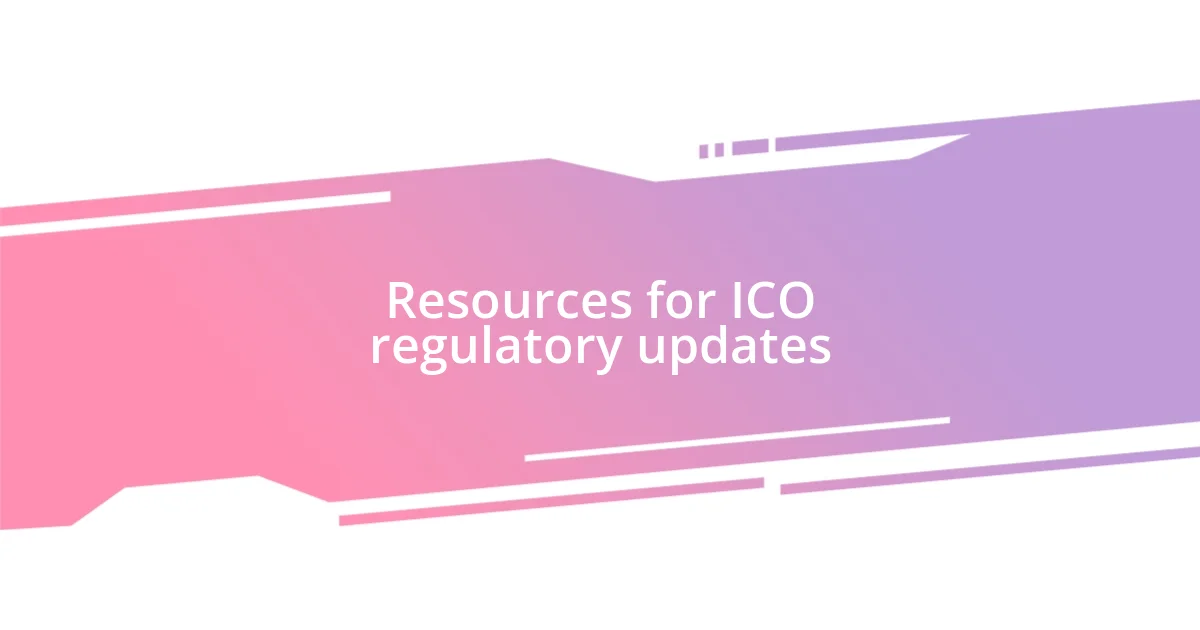
Resources for ICO regulatory updates
One of the most reliable resources for ICO regulatory updates is the official websites of financial authorities in various countries. I remember when I was deep into researching compliance for a client’s ICO; I found the clarity of the SEC’s guidelines truly invaluable. It made me realize that staying informed directly from the source enhances a project’s legitimacy. Are you checking your local authority’s updates regularly? Staying proactive can prevent missteps that could derail your initiative.
Another great way to stay updated is by following industry-specific news outlets and blogs. I’ve often turned to platforms like CoinDesk and CryptoSlate for the latest developments, especially during hectic regulatory shifts. It’s interesting how these resources not only provide updates but also foster discussions around emerging trends. Do you engage with these communities? The insights from real-world experiences shared by others can sometimes be as enlightening as formal regulations.
Lastly, participating in webinars or attending conferences can be a real game-changer. I’ve personally attended several sessions where regulatory experts dissected current trends and future predictions for the ICO landscape. These interactions not only give you valuable data but often spark enlightening conversations. Have you networked at such events before? You might find that engaging in dialogue with seasoned professionals could present opportunities you hadn’t considered yet.
